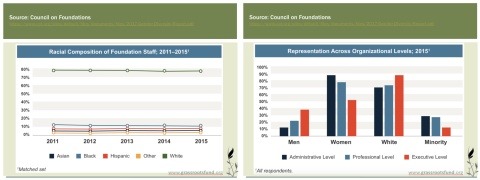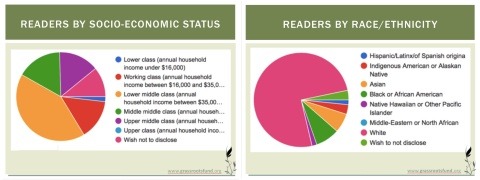In December, we announced the results of our Fall Grow Grant round. We distributed over $100,000 to 47 grassroots groups who are building projects across our region and issue areas, but we are also trying to do something more.
At the Grassroots Fund, we’re going beyond providing funding and assistance to emerging grassroots groups. It’s a bold statement for a relatively small pooled fund, but we’re trying to revolutionize philanthropy. We believe it is our responsibility as funders to seek tangible ways to put those most affected, those doing the tireless work on the ground, at the forefront of decision-making about distributing dollars.
Central to this goal is our participatory grantmaking practices. For each grant round, we put out an open call for readers from our community, who then score the grant applications according to a rubric of our Guiding Values. From that pool of readers, we select a group that is diverse across age, race, class, gender, and region, and invite those willing readers to join us in person and make final decisions, informed by the rubric scores.
Our participants often say that the process of reading applications is meaningful for their work, too. “To sit and read stories of organizations addressing issues that are incredibly prescient and timely, all over New England--it was good for me to be with my ‘neighbors’ who are not my actual neighbors,” shared one of our committee members joining us from rural Maine.
Having a diverse set of voices in the reading process, and in the room as we discuss applications, is even more important when looking at the statistics about who makes decisions in the philanthropic sector. As shown below, in 2015, over 80% of staff working in philanthropy self-identified as "white." And while a majority of staff self-identify as women, men still dominate at the executive level.

Below are some of the statistics for our grant readers and committee members. As you can see from these charts, we still have work to do to meet our targets as well.

As a part of this retreat, committee members participate in a training about implicit bias and white supremacy culture, led by Ita Meno and Brian Hsiang of CQ Strategies, in order to get comfortable with some shared language for talking about potential biases that might arise in the review process. Emily Nink, a committee member from a previous Grow grantee group, Everett Community Gardens, said the equity training helped her to take a closer look at applications that she had made a "snap judgment" of, and inspired reflections about her own work.
Emily was also a member of our Grant Making Retreat planning committee. In line with trying to embed as many democratic practices in this process as possible, three previous committee members made up the planning committee and, along with Program Manager Laura Flagg, gave input on the agenda, and facilitated breakout groups.
Overall, Laura said the committee was tasked with making really difficult funding decisions, and that she was very impressed to see how seriously and diligently these decisions were thought about and made. "Many of the topics we tackled, especially during the equity training, were complicated. I was impressed with how humble and open everyone was, and found the group to be very willing to learn from and along with their fellow committee members.”
Eric Horvath, a Program Manager at Transform Finance, shared that the equity training was, “a little 101,” since he’s often in spaces discussing those concepts, but that it succeeded in bringing a diverse group together on common ground. “I don’t think there’s enough talk about racial equity and bias in the funding world...I was really happy with it.”
At the end of the day, more than funding decisions were made. As we continue to learn from each grant round, this process is both generating questions and distributing solutions across grassroots groups in New England. After the work was done, we sat down to dinner together to informally discuss and debate emergent issues and solutions on our minds, such as the Food Solutions New England 50 by 60 Project, the Green New Deal, or how we incorporate art into our movements; a reminder of the power of convening these geographically disparate changemakers beyond informing value-driven grant-making.
We’re still asking some big questions about how to design this process: How can we best equip our readers and committee members in a given amount of time? How can we limit the primacy of staff opinions, while bringing all the important information to the table? How do we build off past experience and bring in as many new voices as possible? We’re diving into these areas for growth and embarking on some new experiments in 2019. We invite you to join us if these questions excite you as much as they do us.
Interested in becoming a reader for our 2019 grant cycles? Sign up here.

Tell us what you think!
Log in or register to post comments